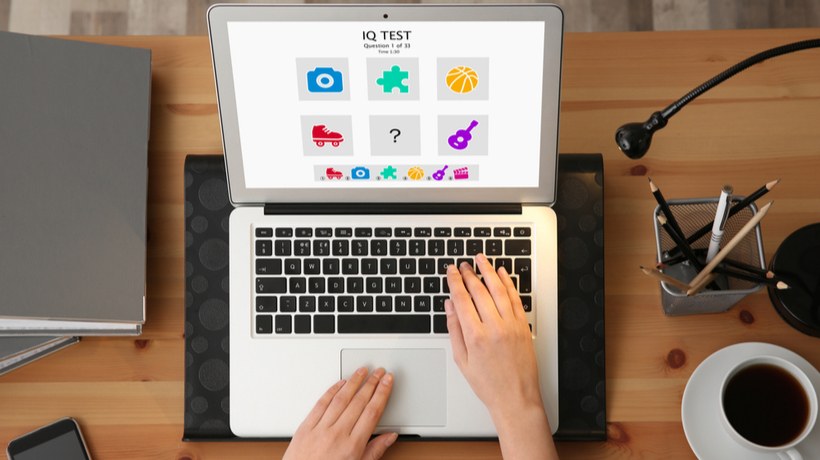IQ tests, or Intelligence Quotient tests, are standardized assessments to measure cognitive abilities and potential. These examinations have been a subject of fascination and debate since their inception in the early 20th century. The concept of quantifying intelligence emerged from the work of French psychologist Alfred Binet, who developed the first modern intelligence test in 1905. His goal was to identify students who might need extra academic support. Over time, IQ tests evolved, incorporating various types of questions and methods to evaluate different aspects of cognitive function. Today, these assessments typically include tasks related to logical reasoning, pattern recognition, verbal comprehension, and mathematical skills. The scores from IQ tests are often used in educational settings, career placement, and psychological research. Critics argue that these tests may only capture part of the spectrum of human intelligence, as they focus primarily on specific cognitive abilities. Supporters maintain that IQ scores predict academic and professional success. The ongoing discussion about IQ tests reflects broader questions about the nature of intelligence and how best to measure it.
What is an IQ Test
An IQ test is a standardized assessment designed to measure cognitive abilities and problem-solving skills. These tests evaluate various aspects of intelligence, including logical reasoning, spatial awareness, and verbal comprehension. IQ tests typically consist of multiple-choice questions and puzzles that assess different mental capabilities. The results are often expressed as a numerical score, with 100 considered average. While widely used, IQ tests have limitations and don’t capture all forms of intelligence or potential.
How IQ scores are calculated
measured skills like verbal comprehension, mathematical reasoning, spatial awareness, and memory. The raw scores from these assessments were then compared to those of a representative sample group of the same age. By analyzing the distribution of scores within this reference group, psychologists determined an individual’s relative intellectual performance. The final IQ score was derived by dividing the test-takers “mental age” by their chronological age and multiplying the result by 100, producing a standardized score with a mean of 100 and a standard deviation of 15.
The modern method of calculating IQ scores
The modern method of calculating IQ scores uses standardized scores with a mean of 100 and a standard deviation of 15. This approach normalizes raw test results, allowing for meaningful comparisons across different ages and test versions. Scores are distributed along a bell curve, with approximately 68% of the population falling within one standard deviation (85-115) of the mean. About 95% of people score between 70 and 130. This standardization enables psychologists to interpret an individual’s cognitive abilities relative to the general population. The system provides a consistent framework for assessing intelligence and facilitating research and clinical applications in psychology and education.
Components of IQ Tests
IQ tests assess cognitive abilities through four key components:
Verbal Comprehension
Verbal comprehension, a key component of intelligence quotient (IQ) tests, assesses an individual’s ability to understand and reason with language. This skill is typically measured through various subtests that evaluate vocabulary knowledge, verbal analogies, and reading comprehension. In these assessments, test-takers may be asked to define words, explain similarities between concepts, or answer questions about written passages. The resulting score reflects a person’s capacity to effectively process and utilize verbal information. A high verbal comprehension score indicates strong language skills, which can be advantageous in academic and professional settings requiring clear communication and complex problem-solving abilities.
Perceptual Reasoning
Perceptual Reasoning assesses non-verbal cognitive abilities through visual puzzles and pattern recognition tasks on IQ tests. This component evaluates spatial Reasoning, visual processing, and abstract problem-solving skills. Test-takers may encounter matrix reasoning problems, picture completion exercises, or block design challenges. Strong performance in this area indicates adeptness at analyzing and manipulating visual information and the capacity to draw logical conclusions from non-verbal stimuli. Perceptual Reasoning scores reflect an individual’s ability to interpret and organize visual data, identify relationships between objects, and solve complex problems without relying on language or prior knowledge.
Working Memory
Working Memory, a crucial component of cognitive function, is assessed in IQ tests through tasks that require temporary storage and manipulation of information. These evaluations often involve digit span tests, where individuals recall sequences of numbers in forward or reverse order. Another standard measure is the n-back task, which asks participants to identify when a current stimulus matches one from n steps earlier in the sequence. The capacity of Working Memory reflects an individual’s ability to hold and process multiple pieces of information simultaneously. This cognitive skill plays a significant role in problem-solving, decision-making, and learning, making it a valuable indicator of overall intellectual capability in IQ assessments.
Processing Speed
Processing Speed, a crucial component of cognitive ability measured in IQ tests, gauges an individual’s capacity to rapidly and accurately process visual information. During assessment, subjects typically undertake timed tasks involving symbol matching, pattern recognition, or visual scanning. The speed and precision one completes these exercises reflect their processing efficiency. This cognitive trait indicates how swiftly a person can absorb, interpret, and respond to incoming data, influencing their performance in various real-world scenarios. A high processing speed score suggests enhanced mental agility, potentially benefiting academic and professional endeavors where quick thinking and decision-making are valuable assets. Understanding this aspect of cognitive function provides insights into an individual’s learning style and problem-solving approach.
Types of Intelligence Measured on IQ test
Crystallized Intelligence
Represents accumulating knowledge and skills through life experiences and formal education. This cognitive ability grows as individuals encounter diverse situations, solve problems, and absorb information from their environment. It encompasses factual knowledge, vocabulary, and practical skills that become ingrained over time. Unlike fluid intelligence, which deals with abstract reasoning and novel problem-solving, crystallized intelligence reflects the depth and breadth of acquired wisdom. This type of intelligence typically increases with age as people continue to learn and refine their understanding of the world. It is crucial in decision-making, social interactions, and professional expertise. Crystallized intelligence allows individuals to draw upon their vast reservoir of knowledge to navigate complex situations and make informed choices.
Fluid intelligence
Represents the cognitive capacity to analyze, adapt, and solve novel problems without relying on prior knowledge or experience. This mental agility allows individuals to think abstractly, recognize patterns, and formulate innovative solutions in unfamiliar situations. Unlike crystallized intelligence, which draws from accumulated knowledge, fluid intelligence operates independently of learned information. It encompasses logical reasoning, pattern recognition, and drawing inferences from limited data. Fluid intelligence is crucial in academic achievement, professional success, and everyday problem-solving. Research suggests that while fluid intelligence tends to peak in early adulthood, ongoing mental stimulation and cognitive challenges can help maintain and even enhance this valuable cognitive resource throughout life.
What are the purposes and uses of IQ tests?
IQ tests serve multiple purposes across various domains. They evaluate cognitive abilities, informing educational strategies, military placements, hiring decisions, and psychological research. These assessments provide insights into problem-solving skills and intellectual potential.
Educational Assessment
IQ tests serve as valuable tools in educational assessment, providing insights into students’ cognitive abilities and learning potential. These standardized measures evaluate mental skills, including logical reasoning, problem-solving, and pattern recognition. Educators use IQ test results to identify students who may benefit from gifted programs or require additional support. The scores can guide curriculum development and instructional strategies, allowing teachers to tailor their approaches to individual student needs. Critics argue that IQ tests have limitations and may not fully capture a student’s intelligence or academic capabilities. Nonetheless, IQ tests contribute to a comprehensive understanding of student aptitude and help inform educational decision-making processes when used with other assessment methods.
Military and Government
IQ tests are valuable tools for military and government organizations in personnel selection and job placement. These assessments help identify individuals with high cognitive abilities for specialized roles requiring advanced problem-solving skills, strategic thinking, and quick decision-making. Military branches utilize IQ tests to screen recruits for various positions, including intelligence analysis, technical operations, and leadership roles. Government agencies employ these tests to select candidates for positions demanding high intellectual capacity, such as research and development, cybersecurity, and diplomatic services. By incorporating IQ assessments into their recruitment processes, military and government entities aim to optimize their workforce, allocating personnel to positions that best match their cognitive strengths and potential for success.
Employment and Recruitment
IQ tests are valuable in employment and recruitment, offering insights into candidates’ cognitive abilities. Many companies incorporate these assessments to identify individuals with strong analytical and problem-solving skills. The tests provide objective data that can complement other evaluation methods, helping create a well-rounded view of applicants. By measuring aspects of intelligence like logical reasoning and pattern recognition, IQ tests can highlight candidates who may excel in roles requiring quick thinking and complex problem-solving. Progressive organizations often use these assessments as part of a holistic approach, combining them with interviews, practical exercises, and personality evaluations. This comprehensive strategy allows employers to make informed decisions, matching candidates’ strengths with suitable positions and fostering a diverse, capable workforce.
Research
IQ tests serve as valuable tools in research across various fields. Psychologists employ these assessments to investigate cognitive development, exploring how intellectual abilities evolve throughout one’s lifespan. Educational researchers utilize IQ tests to examine the relationship between intelligence and academic performance, helping to refine teaching methodologies. In neuroscience, these tests aid in studying brain function and structure, providing insights into the neural basis of cognitive abilities. Geneticists analyze IQ scores to explore the heritability of intelligence and identify potential genetic factors influencing cognitive capabilities. Social scientists incorporate IQ tests in broader studies examining socioeconomic factors and their impact on mental development. These diverse applications demonstrate the versatility of IQ tests as research instruments, contributing to our understanding of human intelligence and its multifaceted nature.
What are the Limitations and Criticisms of IQ Tests
Cultural bias
Cultural bias in IQ tests presents a significant challenge to fair cognitive assessment. These tests often reflect the knowledge, skills, and experiences prevalent in Western, educated, industrialized, prosperous, and democratic societies. Consequently, individuals from different cultural backgrounds may encounter unfamiliar Cultural biases in IQ tests, which presents a significant challenge to fair cognitive assessment. These tests often reflect the knowledge, skills, and experiences prevalent in Western, educated, industrialized, prosperous, and democratic societies. Consequently, individuals from different cultural backgrounds may encounter unfamiliar concepts, language, or problem-solving approaches. For instance, a question about chess strategies might disadvantage test-takers from cultures where chess is not commonly played. This bias can lower scores for equally intelligent individuals from non-Western backgrounds, potentially impacting educational and career opportunities. Researchers and psychologists continue to work on developing more culturally neutral assessment methods to address these inherent biases and provide a more accurate measure of cognitive abilities across diverse populations. Critics argue that current IQ tests fail to capture the full spectrum of intelligence, neglecting valuable skills and knowledge unique to various cultures. This limitation undermines the tests’ validity as a universal measure of cognitive ability and raises questions about their appropriateness in increasingly diverse societies.
Scope of Measurement
While widely used, IQ tests have significant limitations in assessing overall intelligence. These standardized assessments primarily focus on logical reasoning and problem-solving skills, overlooking crucial aspects of human cognition. Practical intelligence, which involves adapting to real-world situations and solving everyday problems, still needs to be measured by traditional IQ tests. For instance, an individual with high practical intelligence might excel at navigating complex social situations or efficiently managing time, skills not captured by IQ assessments. Similarly, creativity—the ability to generate novel ideas and innovative solutions—falls outside the scope of these tests. A person with exceptional artistic or musical talents may not necessarily score high on an IQ test. Emotional intelligence, encompassing self-awareness, empathy, and interpersonal skills, is another critical component of human intelligence that IQ tests fail to evaluate. An emotionally intelligent individual might excel in leadership roles or conflict resolution, demonstrating abilities beyond the narrow focus of IQ measurements.
Variability
IQ test scores can fluctuate based on various external factors, challenging the notion of a fixed intelligence measure. Stress, nutrition, and socioeconomic status play significant roles in test performance. High-stress environments can impair cognitive function, leading to lower scores that may not accurately reflect an individual’s abilities. Nutritional deficiencies can hinder cognitive development and test performance, particularly in developing brains. Socioeconomic factors influence access to educational resources and test preparation, potentially skewing results. For instance, a student from a low-income background might score lower on an IQ test due to limited exposure to certain types of questions or concepts rather than inherent cognitive ability. These variables underscore the complexity of measuring intelligence and highlight the need for contextual interpretation of IQ scores.
The Flynn Effect
The Flynn Effect describes the observed increase in average intelligence test scores over time, first noted by researcher James Flynn. This phenomenon, documented across various populations and countries, shows a consistent rise in IQ scores throughout the 20th century. The effect suggests that each generation outperforms its predecessors on standardized intelligence tests, with an average increase of about 3 IQ points per decade.
Several hypotheses attempt to explain the Flynn Effect:
- Improved nutrition: Better diet and health care may enhance cognitive development.
- Environmental complexity: Modern life’s increased cognitive demands could stimulate intellectual growth.
- Educational advancements: Expanded access to education and improved teaching methods may boost test performance.
- Test familiarity: Greater exposure to testing environments could improve scores.
- Genetic factors: Some researchers propose potential genetic influences on cognitive abilities.
- Reduced environmental toxins: Decreased exposure to harmful substances like lead might positively impact brain development.
- Smaller family sizes: Fewer children per family could result in more resources and attention devoted to each child’s development.
- Increased cognitive stimulation: Exposure to technology and media might enhance specific mental skills.
- Societal emphasis on abstract thinking: Modern society’s focus on abstract concepts could improve performance on IQ tests.
- Hybrid vigor: Increased genetic diversity due to population mixing may contribute to cognitive enhancements.
These potential explanations highlight the complex interplay of genetic, environmental, and societal factors that may contribute to the observed increase in IQ scores over time. Ongoing research continues to explore the underlying mechanisms of the Flynn Effect and its implications for understanding human intelligence and cognitive development.
To conclude IQ tests assess cognitive abilities through standardized evaluations of verbal comprehension, perceptual reasoning, working memory, and processing speed. They find applications in education, recruitment, and research. However, these tests have limitations. Cultural bias can disadvantage certain groups, and the narrow focus on logical reasoning overlooks other crucial aspects of intelligence, like creativity and emotional intelligence. External factors such as stress and socioeconomic status can affect scores, challenging the concept of fixed intelligence. The Flynn Effect further complicates our understanding by showing rising average IQ scores over time. Ongoing research aims to develop more comprehensive and culturally neutral assessment methods for a more accurate measure of cognitive abilities. This progress instills hope for a more equitable and precise understanding of intelligence.




